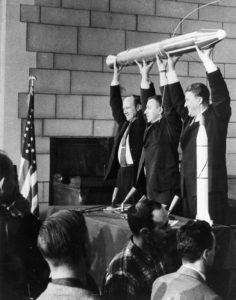1953: Conquest of Everest
May 28, 2022
By AHNZ

Today in New Zealand history, 29 May, 1953, Edmund Hillary and his Napalese companion Tenzing Norgay were the first men to reach the top of the world’s tallest mountain: Mt Everest.
Hillary came of age in the 1930s as part of a generation re-discovering Physical Culture. The Depression had been hard on the young because their elders forced conformity upon them for the sake of scarce resources. The economic downturn excused all sorts of socialistic interventions at the hands of Finance Minister Gordon Coates and his companion Bill Sutch. For example, nationalisation of radio (1931) and the establishment of the Reserve Bank of New Zealand (1934) were permitted by a suitibaly obedient population.
 Stifled 1930s young people were looking for autonomy and an escape from conformity when they set out into the wild. Hillary followed in the footsteps of artist like Elsie Locke and Allen Curnow in exploring the west-Auckland Waitakarie Ranges. In Strauss-Howe Generational archetype Hillary was a Prophet not an Artist and, indeed, he was deeply attached to propegating the Radiant Living philosophy of life. Kevin Ireland describes the elders presiding over this world as “sadistic” dispensers of “systematic thrashings.” Ref. 1930s: Systematic Thrashings, AHNZ
Stifled 1930s young people were looking for autonomy and an escape from conformity when they set out into the wild. Hillary followed in the footsteps of artist like Elsie Locke and Allen Curnow in exploring the west-Auckland Waitakarie Ranges. In Strauss-Howe Generational archetype Hillary was a Prophet not an Artist and, indeed, he was deeply attached to propegating the Radiant Living philosophy of life. Kevin Ireland describes the elders presiding over this world as “sadistic” dispensers of “systematic thrashings.” Ref. 1930s: Systematic Thrashings, AHNZ
Young Edmund certainly fit this mold. He grew up timid and spent 3 hours a day encased in a commuter train to and from Auckland Grammar School from age 11. This restriction barred him from activities either side of school except for the bike ride to and from the station and his home. Through the window and out of reach was a wide blue and green countryside little Ed could look at but not touch. So, it’s no wonder that Hillary became one of the young people to escaped ‘civilisation’ for the forests and ice. It’s no wonder that, among the many of his generation who did the same, Hillary’s extreme stimulus led to an extreme response that led him to the top of the world.
“Access to the high country has always been more or less completely free to the young people of the country, and the last twenty years or so have seen a remarkable growth of interest in mountaineering and ski-ing as pastimes.” -Hight and Straubel (1957)
“Then follow the club climbers of the 1930s. Their predecessors had mostly ventured into this back country in search of pastures, passes, minerals or for survey. The new generation were climbing for climbing’s sake, for the challenge, the achievement and the fun.” – Beckett (1978)
“Where I come from Sherpa Tenzing there’s no such word as asambhava!!” – Ref. 1953: Everest- ‘Kiwi Kids are Weetbix Kids’, AHNZ
 The older generation’s responce to the Physical Culture was, predictably enough, to try to contain it. The Labour 1.0 Government even sought to create a supervising body after the example set by Nazi Germany and put celebrated athlete Jack Lovelock in charge of it! No wonder, Lovelock and Hillary both ran a mile to get away from these pernicious Statists. Ref. 1936: Jack Lovelock, Political Puppet, AHNZ
The older generation’s responce to the Physical Culture was, predictably enough, to try to contain it. The Labour 1.0 Government even sought to create a supervising body after the example set by Nazi Germany and put celebrated athlete Jack Lovelock in charge of it! No wonder, Lovelock and Hillary both ran a mile to get away from these pernicious Statists. Ref. 1936: Jack Lovelock, Political Puppet, AHNZ
Perhaps some part of the reason for World War 2 was to force the young, finally, into putting all that physical energy into the service of The State. The elders sent Hillary and his peers to fight and perhaps die. After the war our culture was looking for ways to capitalise on victory and celebrate how great we obviously were. We needed a prize, revells, a Post-War Boom. For example, the Conquered Pacific Theatre was Converted into Americana.
 New Zealand moved into Mt Everest Dignity Culture (c.1947-52) now, named after its most marked achievement: Hillary’s conquest of Everest. We had intelligent cereal boxes, atomic ice cream, rock music, pioneeir medicine, and William Pickering launching Explorer 1. New Zealand had never done so well and during this time we led the world in our speciality of technological aggriculture and were paid very well for it. When White Island exploded in 1956 our scientists were drawn to it rather than away from it; That’s the difference between NZ in Dignity Culture and the way it has been in the early 2020s. Along with Everest, these achievements were laid at the feet of our very popular Royal Dream Team of Queen Elizabeth and Prince Philip.
New Zealand moved into Mt Everest Dignity Culture (c.1947-52) now, named after its most marked achievement: Hillary’s conquest of Everest. We had intelligent cereal boxes, atomic ice cream, rock music, pioneeir medicine, and William Pickering launching Explorer 1. New Zealand had never done so well and during this time we led the world in our speciality of technological aggriculture and were paid very well for it. When White Island exploded in 1956 our scientists were drawn to it rather than away from it; That’s the difference between NZ in Dignity Culture and the way it has been in the early 2020s. Along with Everest, these achievements were laid at the feet of our very popular Royal Dream Team of Queen Elizabeth and Prince Philip.
Unfortunately, this version of New Zealand never lasts and our string of accomplishmentscame to a disturbing end. The Boomers came of age and their Awakening shattered the old consensus. The Dignity Culture led, as always, to Victimhood Culture. The change-over was heralded by the death of Opo the Dolphin in March ’56 and made obvious by the Victimhood Culture women who tried to make a railway economically efficient by sitting upon it.
“The local population can take ownership of that success in a way that is strangely proprietorial.”
Tall Poppy Syndrome has been observed time and again in New Zealand. Back in 2015 NZ writer Eleanor Catton tried to puzzle out why it was that her success, on the one hand, led to attack but, on the other hand, led to the urge to share it. It seems like a paradox but it’s not. NZ businesswoman Lani Fogelberg observed the same thing more recently saying, “Win $2 million in Lotto and you’re celebrated. Earn $2 million busting your arse to help other people and you’re criticised. Welcome to New Zealand.”¹ It seems like a paradox but it’s not.
These women are grasping for the idea that a thief is in a position of ambivalence. He acknowledges your value and wants to parkake of it while simultaniously hating someone else, you, the generator, for acknowledging the exact same thing. It’s a sort of Double Think. When a thief takes something from you it’s a bankrupt sort of ‘salute’ of appreciation because he is also saying that what you own is good enough to steal.
“We have this strange cultural phenomenon called “tall poppy syndrome”; if you stand out, you will be cut down. One example is that the New Zealand Book Award that follows the announcement of the Man Booker Prize, in the year The Luminaries won it, there was this kind of thing that now you’ve won this prize from overseas, we’re not going to celebrate it here, we’re going to give the award to somebody else. If you get success overseas then very often the local population can suddenly be very hard on you. Or the other problem is that the local population can take ownership of that success in a way that is strangely proprietal.” – Catton, Mint (2015)
“The tall poppy syndrome here is worse than in Australia. The responses are pretty aggressive and it’s getting worse. If you’re successful in business, people treat you well to your face but behind your back, it’s different. They don’t want to be associated with successful people; rather than being celebrated, they’re viewed as someone not to hang out with,” – ‘Earn $2 million and you’re criticised’: Entrepreneur wishes she’d quit NZ, Fogelberg, Newstalk ZB (2022)
“We only read other people’s sages, other countries wiseacres. Our seers, visionaries and artists are in seclusion where society deems they belong. And if they take it upon themselves to find a public platform and speak up, they are resented, hissed at, called arrogant that they should dare to attempt to influence events.” – p87 McLauchlan (1976)
“A true Legend…I love it when I walk up those stairs in the Auckland museum in the domain and see that huge painting of him on the wall..huge pride as a New Zealander.” – Richard Hawkings comment to AHNZ
Hillary was certainly in the same boat as the above women and was at risk of being New Zealand’s most persecuted Tall Poppy. The reason he wasn’t is because the conquest he achieved with Tenzing Norgay was ‘strangely appropriated’ to Queen Elizabeth and the British Commonwealth and he didn’t fight it. New Zealanders have appropriated Hillary’s own act and feel huge vicarious pride as a New Zealander is if it were us, not he, who did the work. We are quicker to commend ourselves even than the climbing team and not only do we not credit the members of the British Mount Everest Expedition we don’t even know their names. Who was Colonel John Hunt? “Strangely proprietorial” indeed.
A Tall Poppy New Zealander is someone who refuses to pretend that their individual acomplishment belongs to everyone else in his country too. The moment you try to own your own achievement and feel your own emotional rewards for your own actions you become the target. I think Hilllary denied himself that recognition like a good little school boy on the train for his entire life. If he ever showed legitimate pride then out would have come the Poppy Pruners. This self-denial and suppression, in my opinion, were responsible for a personality I observed as being bitter and grumpy.
New Zealand Tall Poppy Culture
New Zealand Tall Poppy Culture is especially activated if any of us stand out internationally. We don’t really mind how proud you are if nobody is listening and watching. It’s a corrupt family system pre-occupied with the reputation fo the family name. If your pride is on display on home ground it’s no concern but if you behave the same way in public where outsiders can hear then you’ll really upset the New Zealander. Eleanor Catton found this out from Sean Plunket in 2015 when she pointed out that our politicians are “shallow and money-hungry…who did not care about culture,” and he called her “an ungrateful hua.” Ref. Stuff (2015)
Earlier in Plunket’s career that would have flown just fine but because it was 2015 we found out two mitigating things. Firstly, the Me Too movement was about to get underway and it wasn’t OK to be mean to girls.
Secondly, the post-Gen X generations didn’t know what a ‘hua’ was and thought it meant ‘whore’. Gen X politician, Paul Goldsmith, told Prime Minister Jacinda Ardern in 2020 to “stick to your knitting” and prompted the same misunderstanding. Millennials apparently did not know this colloquialism either but took that literally…like PM should quit politics and take up female handicrafts? Is that what this is? Yep..
“Goldsmith has since conceded it was not the best choice of words because younger people, including his own children, did not understand the metaphor.” – NZ Herald (2020)
The history of New Zealand is the history of the clash of different generations. Paul Goldsmith (b.1971) is a Generation X politician and history author. He worked his way up the ladder by writing flattering biography books about right-wingers (eg John Banks, Don Brash, Myers, Fletchers, William Gallagher, Alan Gibbs,…) until he got the Epsom electorate and a safe List seat.
—
1 Note: To be clear, a Lotto winner is not celebrated. They are enveloped into a well funded publicity campaign to sell more Lotto tickets under the cloak of a celebration.
Image ref. Kiwi Kids are Weetbix Kids TV commercial, 1990s
Image ref. Ed on the money, Te Ara.gov
Ref. The Mountains of Erewhon, Beckett (1978)
Ref. A History of Canterbury, J Hight and C.R. Straubel (1957)
Ref. The Passionless People, Gordon McLauchlan (1976)
2 thoughts on "1953: Conquest of Everest"
Leave a Reply
 Like Comment Share
Like Comment Share






From memory it was 1987-88 I was commissioned by the then Hillary Commission for Sport and Recreation to create the awards for the inaugural Hillary Commission Festival of Adventure Films held in Wellington.
The winner in each category received a scale replica carved in Native Heart Rimu, of the ice axe Hillary carried to the top of Everest.
I created 14 and to have been associated with a true Kiwi Hero of our time has been, ( after the birth of my children), the highlight of my creative life
Imagine having more than one Adventure Film let alone different catagories in a single year. That’s the Honour Culture era for ya.